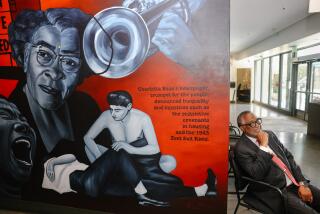Readers React: Ferguson protesters aren’t ‘looters’ or ‘thieves’
- Share via
To the editor: Fifty years ago as a teenager, I stood in the foothills of L.A. and watched the streets of Watts in turmoil. After sunset, it was a dark rectangle surrounded by a city of lights. Here and there a business on fire cast a disturbing glow. (“Ferguson protests lure many from across the U.S.,” Aug. 20)
I was appalled to hear the media railing against the “criminals,” “looters” and “thieves.”
Too many don’t understand the basic social contract: I will respect your laws, your property and your rights only if you respect mine. Ferguson, Mo., teenager Michael Brown had the right to live.
The people of Ferguson are not taking up arms to kill the innocent; they are demonstrating in a profound way the consequences of disregard for the social contract by those in power.
Jane Kennelly, Chino
..
To the editor: There are many questions raised by the unrest:
Where are and who are the community leaders? (Al Sharpton and the police captain are not in that group.) Why was a white person reelected mayor in 2013 after running unopposed in a city where a majority of the population is black? Why is there only one black member of the Ferguson City Council?
Do more people in the majority group in Ferguson care enough about their community to become active in its leadership?
Gary M. Barnbaum, Woodland Hills
..
To the editor: The events in Ferguson are proving we live in two Americas: one that is forced to care about racial issues, and another that’s often privileged enough not to.
The media has widely reported that far more blacks believe the killing by a Ferguson police officer of Brown raises racial issues; however, whites’ lack of opinion is far more concerning. A Pew Research Center poll states that while only 2% of black individuals questioned said they were unsure whether “the case raises important issues about race,” a whopping 16 % of the white individuals said the same.
White people are eight times as likely to feel undecided about the racial element of this case, essentially saying, “Not my problem.” The nation must commit to attain a collective resolution, a feat nearly impossible if one side doesn’t feel passionately enough to have an opinion.
Maggie Cunha, Chestnut Hill, Mass.
More to Read
A cure for the common opinion
Get thought-provoking perspectives with our weekly newsletter.
You may occasionally receive promotional content from the Los Angeles Times.






